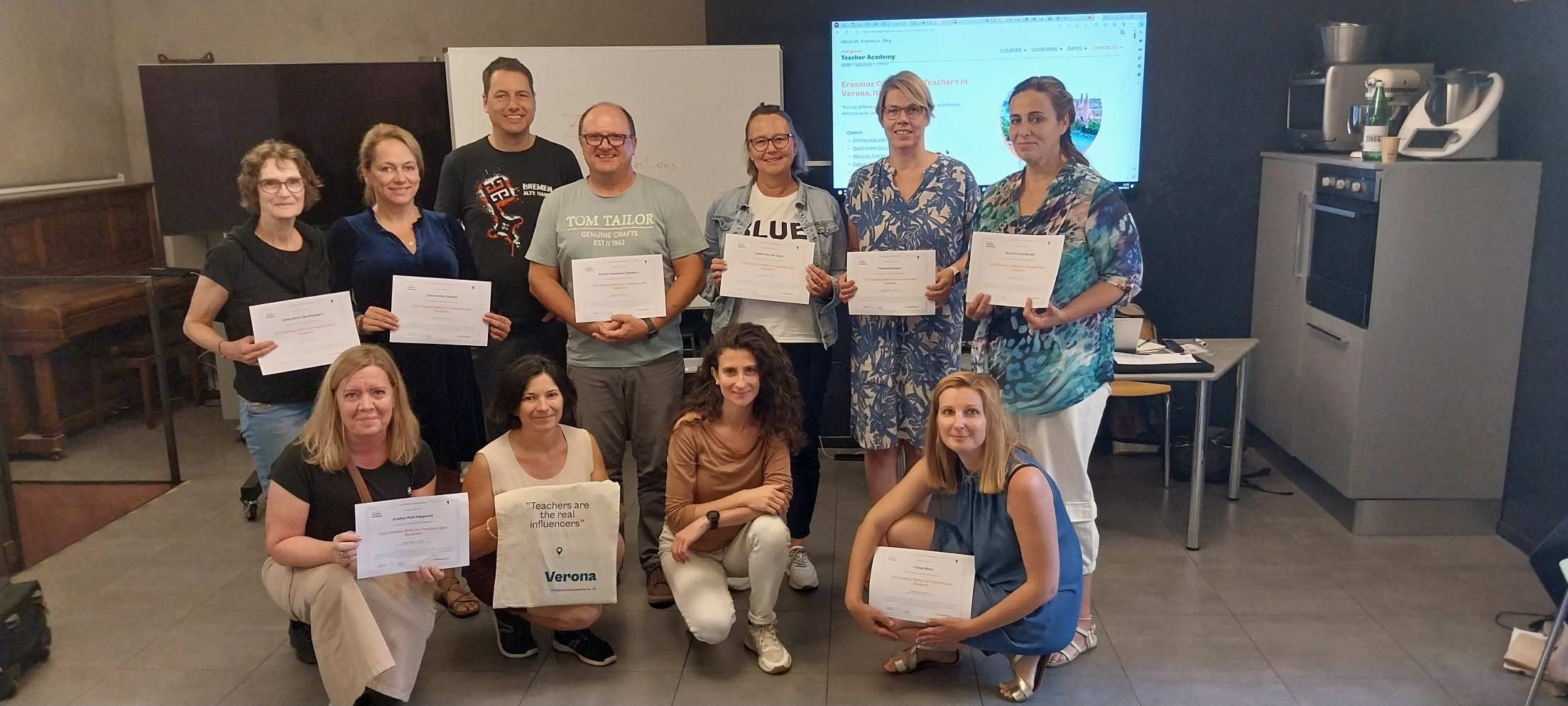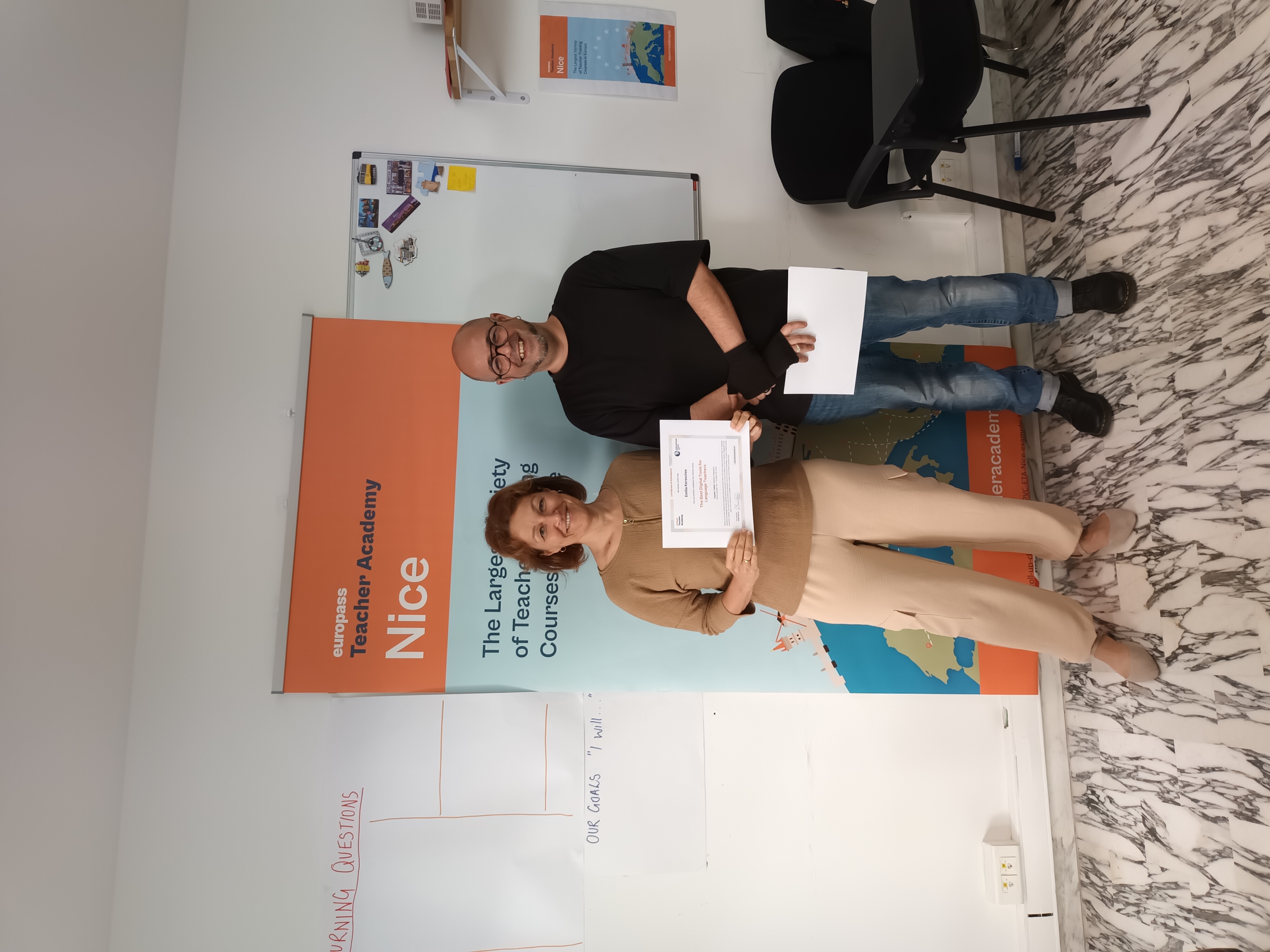
The Illyés Gyula High School, Technical School and Vocational Training Institution Budaörs has embarked on a digital self-development journey with the help of Erasmus+.
We are brave, we dare to take steps, learn and change
Awarded Institution: Budaörsi Illyés Gyula Gimnázium, Technikum és Szakképző Iskola (Illyés Gyula High School, Technical School and Vocational Training Institution, Budaörs)
Awarded Project: From Digital Immigrants to Settlers!
Interview with Keresztes Emília, English teacher at the Illyés Gyula High School, Technical School and Vocational Training Institution, Budaörs.
What motivated you to start your project?
During the planning phase of the project, we came across this sentence from Kristóf Zsolt: “Digital immigrant teachers use ICT tools and digital content in a smart and varied way. They also know that ICT tools cannot and should not be used for everything. As a result, the project team (10 people) jointly formulated the goal of transforming ourselves from digital nomads into digital settlers – on the one hand, to set an example of lifelong learning for our students, and on the other, to continuously develop and be able to bring the curriculum closer to students in the world of smartphones and laptops.
What was your aim with the implementation of the "From Digital Immigrants to Settlers" project?
We set several goals. The first was to develop teachers’ skills, broaden and renew their methodological repertoire. The second goal was to create and effectively operate a school-level virtual teaching and learning environment. We also aimed to expand our school’s international connections and opportunities for cooperation.
During the project, training sessions took place in four countries. What practices and experiences did you bring back from each country?
In Italy, four participants learned, among other things, about the use of mobile devices as teaching tools, creating multimedia learning environments, and developing 21st-century skills for both teachers and students. Two of our language teachers visited France and learned about digital tools that are useful in language teaching. On the Irish course, the flipped classroom was the main topic. In Malta, one of our colleagues participated in a language course.

What digital tools did the project participants become acquainted with?
We acquired numerous modern pedagogical methods and strategies: PBL (Project-Based Learning), CLIL (Content and Language Integrated Learning), Flipped Classroom, and TPS (Think, Pair, Share). Besides these methods, we also got to know specific digital tools, apps, and websites, learned how to use them, and explored ways to integrate them into lessons and their possible areas of application. ClassroomScreen became a favourite, but many of us use Padlet, Genially, Mentimeter, and MagicSchool on a daily basis.
Could you highlight a memorable moment from the collaboration?
Perhaps the moments of choosing the title, because the preparation of the project was a truly collaborative creative process, and the project title itself was the result of this. Also, since this was our first Erasmus+ project, everyone was excited and supportive when the first group set off, hoping everything would go well.
What processes have been initiated in the institution as a result of the project?
The proportion of using digital technology among the teaching staff has noticeably improved, and the project’s impact on shaping our mindset is also clearly felt. Teachers who participated in the trainings are more confident in handling digital tools and interfaces and can support their colleagues with their experiences.
After the mobilities, the participants reported on their learning at staff meetings, shared good practices, and demonstrated how they can integrate these into their teaching activities.
| Within the ongoing classroom visits, colleagues can observe the applied techniques and tools firsthand. Good practices are also spreading through brainstorming and informal sharing. |
Meanwhile, the school has switched to using the GSuite package - meaning we work on shared drives and shared files, hold online meetings on Google Meet, everyone can see the work plan events in the shared calendar, and we have established standard communication channels. More and more digital teaching materials are being created, workgroups develop and use these materials together, and the proportion of users of the virtual learning environment is also increasing. We can say that we have begun our journey from digital nomads to digital settlers.
How has the impact of Erasmus+ and the knowledge gained during the project been integrated into the school’s everyday life?
A significant improvement is visible in the SELFIE (a digital snapshot) section related to classroom teaching. This section covers the implementation of digital technologies in the classroom, the updating and renewal of teaching and learning practices—such as student engagement, adapting to students’ needs, promoting creativity, and fostering collaboration among students. In other words, the methodological development of teachers is reflected in everyday work and has reached the students.
In your opinion, what was the greatest benefit of the project for the participants and the institution?
Since this was our first successful application, the fact of winning the project itself was a strong motivator for the teachers. Inspired by the positive experiences and significant motivation of the enthusiastic project team, we have since completed another Erasmus+ application, in which new colleagues also participated. This year, we have become an accredited institution, so next year we will also organize student mobilities. Through the Erasmus+ projects, the school’s international dimension has strengthened, and we are making good progress in internationalization.
Have you experienced any changes in the everyday life of the institution, in the mindset of those involved, and in the development of an international outlook?
The 10 training courses represented a significant step in the institution’s transformation into a learning organization. This is demonstrated by improvements in the SELFIE results at the start and end of the project in the following areas: discussions about technology use, professional development needs and participation, and the sharing of experiences. Teacher networking has begun, and networked (anytime, anywhere accessible) information access has been realized.

What are you most proud of regarding the project?
We are proud that we are brave, we dare to take steps, to learn, and change.
How did you disseminate the project results?
A small group of participants led a session at the Budaörs Pedagogical Day. Teachers from numerous institutions in the city registered for this event. Before the workshop was held at the No. 1 Primary School, we displayed a poster about the project at the venue. Through the QR code on the poster, we made the content learned in the courses available to everyone in the form of PowerPoint files.
At the workshop, we presented digital tools, websites, and methods that hopefully will have an impact on the work of those present, as well as their school communities. Posts on the school’s Facebook page and website, as well as an interview broadcast on Budaörs TV, increased the visibility of both the school and the project at local and national levels.
What other social actors might find the results and experiences of the project interesting and useful?
Outside of schools, perhaps communities and organizations where digitalization makes daily work easier, where shared folders, document and email systems, and targeted communication groups increase efficiency and facilitate teamwork. It is also an important consideration that digitalization can significantly reduce the amount of printing and photocopying.
What does winning the Erasmus+ Excellence Award mean to you?
| At Illyés, high quality is one of the most important benchmarks for all our activities, products, and goals. We are very proud that this innovation also reflects our aspiration, especially in such a highly esteemed and honourable competition. |
Photos: Illyés Gyula High School, Technical School and Vocational Training Institution, Budaörs
Introducing the 2025 Erasmus+ Nívódíj (Excellence Award) Award-winning projects!
Last modified: 30-06-2025















